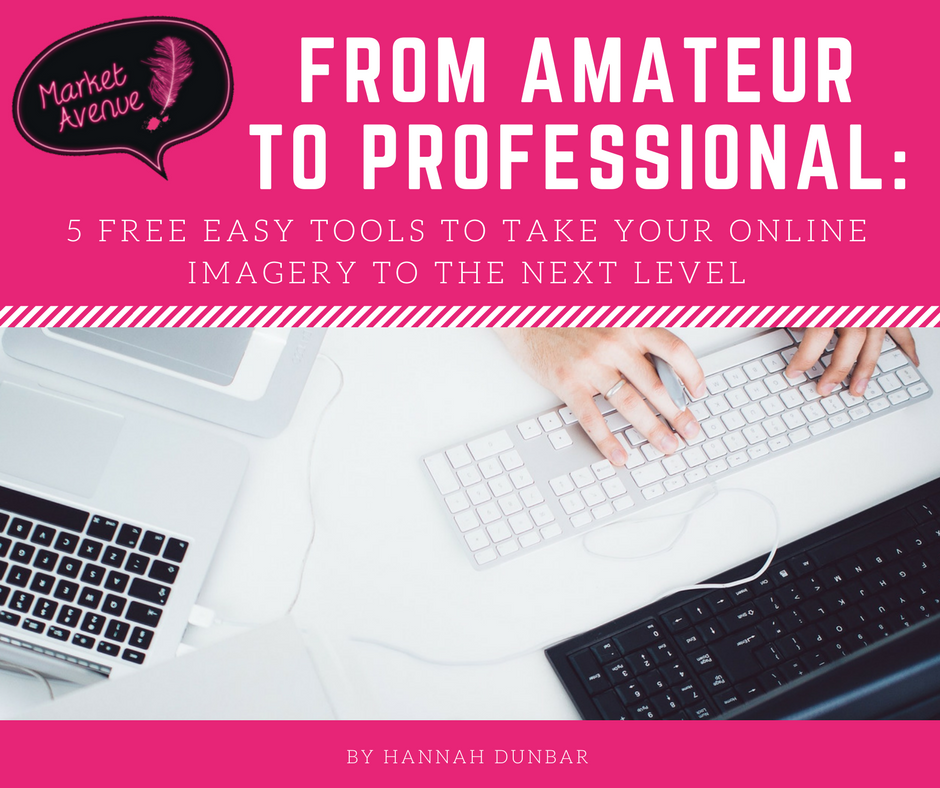
13 Feb From amateur to professional: 5 free easy tools to take your online imagery to the next level
Welcome to 2017: we live in a world where hundreds of apps are created every day that aim to help you achieve something. Whether it’s keeping in contact with old friends, relieving boredom with the latest game, or keeping you informed about important news events, there is always an app, a tool, or a program that can aid you. And guess what? Many of them are free!
So why can’t you utilise a tool to help you and your business with online imagery? You can! You just need to know where to start…
It’s the small things that make a difference…
We get it; sometimes it’s just easier to pay someone else to do it. But for small businesses this is not always feasible. More often than not, new ideas and offers can spring up spontaneously. Your business may want to take advantage of a trend or news story, but by the time your requirements are sent to a design company, the moment is gone and your good idea is wasted. Having a middleman is an added complication that makes it that much harder to capitalise on the ever-changing trend landscape that is now an integral part of marketing, and social media marketing in particular.
So what can you do? We have an idea: compromise.
Embracing your creative side
Okay, so you’re not very artsy or creative – but I bet someone in your company can work their way around a computer and has satisfactory design instincts. The beauty of the internet means you don’t have to be an artist, you just have to recognise what looks good. The computer does all the work.
So let’s start. Introducing…
1. Canva
We’ve talked about this wonderful online tool before, and for a detailed overview of it, have a read of our other blog Canvassing Canva here.
To summarise, Canva is an online graphic design service that allows you to create graphics for everything from print to social media, headers to profile pictures etc. It offers a selection of templates, all with editable elements to them so that no two images have to look the same. You can upload any of your company images or logos to the platform so stamping your own brand is easy peasy lemon squeezy.
Suddenly, creating a new graphic to use on your social media doesn’t seem so hard. Choose your size (Facebook image, Twitter image, Email header), click on a template, add your company logo, edit the colour scheme and font to match your brand and voila! A design ready to be posted. As you get used to using it, you’ll find yourself producing simple graphics in a matter of minutes.
2. Lunapic
If the only logo you have has a white background on it, and it just doesn’t look right on your Canva design … what do you do? Use it anyway? It doesn’t make that much difference does it? Don’t include your logo at all?
Or, you could use Lunapic, an online image editor. It has many features that can be used to edit a photo, or an image for that matter, but the one that we find most useful is its ‘Transparency’ tool.
Under the ‘Edit’ menu, select ‘Transparent’ and upload your logo. Then, all you have to do is click your background colour (it doesn’t have to be white) and the editor will make it transparent.
3. Pixabay
Can’t find the perfect picture? Photography costs money, and quality images are expensive. Even popular sites such as Stockphoto and Graphistock can become pricey, as you try and avoid using the same image more than once for some variety.
Pixabay is a completely free photo source, and sure, you sometimes have to wade through a lot of weird photos to find something you can use, but at the end of the day it’s free. You don’t have to sign up to anything, and it has a search function to cut down on your browsing time.
All you have to do then is upload your free photo to Canva, add some text to it, add a logo, and there you have it: a professional looking graphic. Created for free.
4. ColorZilla
Of course for some things such as printed brochures or posters, you may want to source a professional. We don’t blame you! Why risk something going wrong? So, you’ve paid to have a poster done but you want to replicate it for online purposes. How can you match the colour scheme – exactly?
With ColourZilla of course! This is an extension that can be added to the toolbar on your browser, and uses its ‘pipette’ function to give you the colour code of any colour on a webpage.
5. Jpegmini
Think your professionally-produced image from a graphic designer could work well on your social media? Perfect! You upload it to Twitter or Facebook and click post … but it turns out the file is too big for social media and it gets rejected. Oh well, never mind.
But wait! With jpegmini, a large file can be reduced in size, allowing it to be uploaded to any site you want, without any visible change occurring to the image.
In conclusion …
So there you have it. Five tools to help get you started with creating your own graphics for use online on your website, email campaigns, or social media profiles. And they’re all free! Sure you’ll have a few hit and misses as you get used to using them, but ultimately you’ll save time, money, and may even get some new leads! By cutting the middleman out and creating graphics in-house you’ll find your process times halve – and your ability to capitalise on current news, events or trends increase exponentially.
Give it a go! What have you got to lose?










Sorry, the comment form is closed at this time.